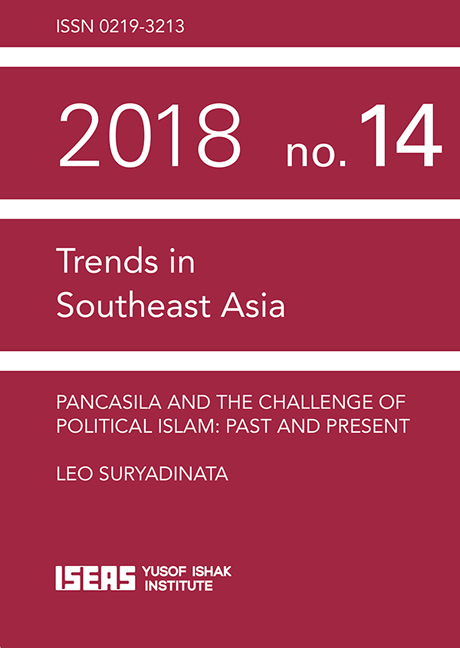 Pancasila and the Challenge of Political Islam
Pancasila and the Challenge of Political Islam Pancasila and the Challenge of Political Islam: Past and Present
Published online by Cambridge University Press: 12 February 2019
Summary
INTRODUCTION
On 10 July 2017, President Joko “Jokowi” Widodo promulgated the new “Mass Organizations Law” (Perppu no. 2/2017) that empowers the state to ban mass organizations opposed to Pancasila. A few days later, the Ministry of Home Affairs declared Hizbut Tahrir Indonesia (HTI, or Indonesian Liberation Organization), which promotes the establishment of a Caliphate (khilafa) or a theocratic Islamic State, illegal. In recent years, Indonesia has witnessed the rise of hardline Islam as a challenge to the state ideology Pancasila. There are worrying signs of religious intolerance. The indicators are: the winning of Arab-Muslim candidate Anies Baswedan over the Chinese-Christian candidate Basuki Tjahaja Purnama (better known as Ahok) in the Jakarta gubernatorial election on 9 May 2017; the harsh sentence passed on Ahok over the “blasphemy against Islam” case after the election; and General Gatot Nurmantyo's close association with hardline Muslim organizations.
Despite 87 per cent of its total population being Muslim, Indonesia has been a “secular state” or a “Pancasila state” since independence in 1945. Pancasila means Five Principles, and was first initiated by Sukarno on 1 June 1945. It includes Belief in One Almighty God (Ketuhanan yang Maha Esa), Indonesian Unity, Internationalism, Democracy through Deliberation, and Social Justice for all People. This is a complex ideology, which does not only address the issue of religious pluralism but also democracy and social justice. Its inclusiveness and also ambiguity, has helped make it acceptable to most Indonesians.
It appears that the first principle of Pancasila, “belief in one almighty god”, has become prominent. While “Ketuhanan yang Maha Esa” has been interpreted as belief in god, any god; and therefore does not have to be monotheistic phrase; some have interpreted it as “belief in one lordship”. In other words, they have felt that “monotheism”, not “polytheism” should be reflected in the recognized religions. During the New Order, many non-monotheist religions such as Buddhism, Hinduism and Confucianism had transformed themselves into apparent “monotheist” religions.
Whatever the case, the principle in the Indonesian 1945 Constitution remains the guide for social and political behaviour. Clause 29 reads: (1) “The State is based on the principle of One Lordship (Negara Berdasarkan atas Ketuhanan yang Maha Esa); (2) The state guarantees the freedom of every person to profess his/her own religion and to worship in accordance with his/her own religion and belief.”
- Type
- Chapter
- Information
- Pancasila and the Challenge of Political IslamPancasila And The Challenge Of Political Islam: Past And Present, pp. 1 - 20Publisher: ISEAS–Yusof Ishak InstitutePrint publication year: 2018
